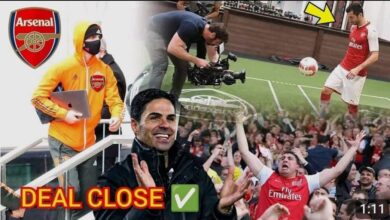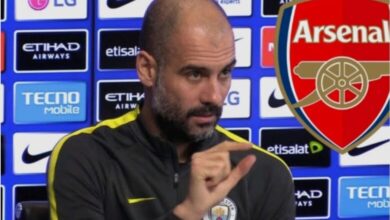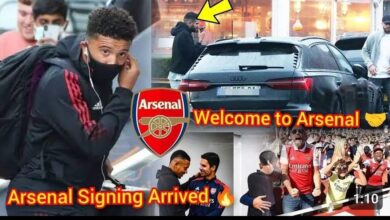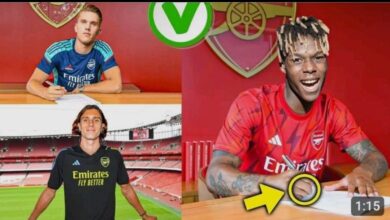Why Manchester City’s Pep Guardiola is doubling down on four centre-backs
Why Manchester City’s Pep Guardiola is doubling down on four centre-backs

“If we need to play with full-backs wide, up and down, like 99 percent of the teams play, we cannot do it; we don’t have players to do this right now,” Pep Guardiola remarked prior to his Manchester City team’s FA Cup quarterfinal win over Championship visitors Burnley in March. We must adjust because we lack this quality.
Guardiola was then questioned about whether City would search for individuals with such traits this summer on the transfer market.
He answered right away without even waiting for the inquiry to be finished.
“Yeah,” he replied. Yes, it’s crucial for the future.
At the time, the goal was to find something different this summer, maybe in a nod to City’s attempt to bring in four powerful, quick, attacking full-backs during the equivalent window in 2017 following Guardiola’s first season as manager.
The fact that he spoke during the early stages of the post-World Cup rebirth that led City to their triple is crucial.
Since Joao Cancelo’s departure in January, Guardiola has been experimenting with his full-backs, with Bernardo Silva, Rico Lewis, and John Stones occasionally appearing in midfield alongside Rodri.
Prior to that encounter against promotion-bound Burnley, they defeated RB Leipzig 7-0 at home in the round of 16 of the Champions League, turning in their greatest performance in weeks.
The following week, City destroyed Liverpool (4-1) and put six past Burnley, with Stones excelling as a right-back stepping forward. Stones quickly became established in that position, and suddenly Stones, Manuel Akanji, Ruben Dias, and Nathan Ake made up Guardiola’s back line.
That caused him to be compared to Tony Pulis, the renowned route-one football manager from Wales who enjoyed doing the same with his Stoke City and West Bromwich Albion teams in the 2010s.
Naturally, it also earned him a historic triple. According to Guardiola, the defense change made this season’s City team, who won everything but the Carabao Cup, different from previous ones.
Guardiola made the comment on the field immediately following his team’s victory over Inter Milan in the Champions League final.
“I would say with four central defenders we defend properly in our box,” Guardiola remarked. It is a significant step.
We now take pleasure in defending, and I feel as though we are defenders even when we make mistakes.
So much so that, no, City is not looking for ‘up and down’ full-backs in this summer’s transfer market after all; the strategy of using four center-backs will continue in the upcoming campaign.
However, Guardiola won’t always follow the same game plan, particularly early in the season when there is a component of trial and error.
As a result, Lewis and Kyle Walker (assuming he stays, despite interest from Bayern Munich), will have opportunities.
Walker demonstrated his importance in the two Champions League semi-final matches against Real Madrid in particular, and he will be a tremendous asset if he decides to stay. However, the fact that he missed significant amounts of time last season is a consideration in his probable move to Bayern.
And Josko Gvardiol, a 21-year-old Croatian international who can play as a centre-back and a left-back and is good in possession, is City’s top summer transfer target and perfectly complements the center-back-at-full-back strategy. He and City had already agreed on personal terms.
It is now necessary to accomplish the same with Leipzig, who demand at least €100 million (£86.3 million, $108.9 million) for a player with a contract that expires in 2027.
Even if Gvardiol doesn’t show up (and City will work to make sure he does), the strategy is to typically line up with four large defenders spread across the back.
Why not, then? For years, it was argued that Guardiola’s possession-heavy style of play was susceptible to the counter-attacking aspect of cup game, especially at the highest level, whenever City lost in the Champions League.
The biggest argument was that City needed too many chances to score whereas their opponents in those crucial games only required a few counterattacks.
Other contributing causes included blunders, allowing goals in large numbers, and bad luck.
Following his acquisition by City last summer, Erling Haaland has given a solution up front, but Guardiola has been arguing for the past few months that City’s biggest improvement really occurred at the opposite end of the field.
He stated, “In this competition, the Champions League, you always have to defend well one against one in the final third — really, really, really well — and win the duels,” following their 3-0 victory against Bayern Munich in the first leg of a quarterfinal matchup in April. “Don’t worry about what’s going to happen; don’t be anxious.”
Stones switched from right-back to center-back in that match against Bayern, while Akanji, Dias, and Ake each put on outstanding individual performances of ‘correct’ defending by winning their headers and making tackles and blocks.
In an interview with professional striker turned TV analyst Thierry Henry three weeks prior to the Champions League final, Guardiola brought up the subject once more.
“You cannot play 80 or 90 minutes in the opposition half and concede every time you lose the ball and they make a transition,” he said. That’d be foolish.
But now, the difference is that Akanji is a proper defender, John Stones always has tremendous focus, and Kyle is able to handle Vinicius Junior of Real Madrid, one of the most dangerous wingers in the world, without any issues. We have Nathan Ake, who can control (Arsenal’s Bukayo) Saka in one-on-one matches, regardless of the right-winger we are up against (he puffs out his cheeks). And Ruben is incredibly talented.
“People often comment on wonderful passes or goals, but I believe that a competent defender has the greatest talent in football. We now have guys that relish playing defense and declaring “I beat you,” and this season has seen a greater number of those players than in the past.
Guardiola has realized that teaching defenders to be better in possession is easier than teaching players who are already better in possession to defend.
Cancelo and Oleksandr Zinchenko, for example, have greatly contributed to City’s recent wins and have all grown defensively while playing for the team, but they lack the same blood and thunder defending prowess as those Guardiola cited in his previous response.
It’s significant to note that Guardiola concluded his response by saying, “But trying to control opponents, it has always been the same.” After the post-Bayern response, he continued, “I would have loved to have much more possession, because always I believe that as much as you have the ball, the less actions the opponent will have.”
Henry had mentioned that Guardiola was less “crazy” with his approach against top teams, a little more wary of the attacking threats posed by Arsenal at home and Madrid in that semi-final, and this ties into an idea that has been floating around for the past few months: that he has changed his approach to allow games to be more end to end, more open.
Guardiola lamented his team’s failure to maintain possession of the ball after City’s 3-1 away victory against Arsenal in February, a game in which they only had 36% of the possession.
Two months later, in the rematch, Guardiola was seen berating goalkeeper Ederson for passing to Stones and forcing the defender to kick the ball long.
City went on to win 4-1, and the opening goal, which came from a long ball forward from Stones, has been cited as another example of Guardiola being happier to switch up his style. Guardiola did not want it, even if it resulted in a goal.
When questioned about his alleged alteration, Pep responded, “When people say, ‘Pep wants to control the ball (for) 90 minutes,’ well, that’s what I’m fighting for every single day, to have 90 minutes control of the game, to score a lot of goals, allow little chances.
However, you must also acknowledge that sometimes it doesn’t because the opposition plays (good).
Therefore, it is not on purpose that there has been less control over matches. The process of integrating Haaland into their system had an impact on City’s ability to control games as they had in the past, but under Guardiola, they are better prepared than ever to deal with a loss of control thanks to their Norwegian striker’s fearsome potential on the break and their defenders’ enjoyment of engaging in duels to stop the counterattacks that had previously derailed them.
Guardiola constantly states, “It’s the quality of the players,” with the implication that he adjusts to whatever is available to him in his roster. On that particular day in March, when he was asked about full-backs, no one dared to even speculate that City would be celebrating a treble less than three months later, and the question was posed in the context of how they had adapted to Cancelo’s departure.
Many people were unsure of how City would fare after losing one of their two senior full-backs in the middle of the season, but after a few experiments, Guardiola found a solution that has probably improved his team more than ever.
It makes sense why he will continue for the upcoming season.



